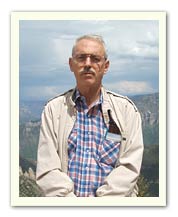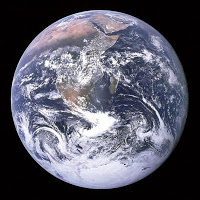 By Michael Beck
By Michael Beck
The Earth is alive. Long championed metaphorically by environmentalists, this idea now enjoys the acceptance of growing numbers of scientists who theorize that all living things and their support systems (air, water, and land) indeed interact globally to stabilize one another to maximize life. James Lovelock first proposed this Gaia Hypothesis in the 70’s, just to see it resoundingly ignored for a decade. Then it gained credence as evidence began to mount for it, everything from the co-evolution of species to the surprisingly constant salinity and pH of the oceans, all contributing to the whole, now usually referred to as the biosphere.
The Earth is alive, but is it well? In the Gaia Hypothesis, the harmony of the biosphere actually overarches the more limited Darwinian “survival of the fittest.” Species compete, but biologists now understand that the ultimate competition is not to wipe each other out; it is for each to best thrive in mutually constructive conflict, the essence of co-evolution. The interactions among species in any given region show a stupendous complexity that maximizes their survivability. Even more important, the long-term vitality of these species depends on success in adapting themselves to – harmonizing with – the overall biosphere.
Many scientists, though certainly not all, accept that the biosphere acts as a living, self-regulating organism. Nonetheless, virtually every earth and life scientist on the planet agrees that:
1. The biosphere is globally interconnected.
2. Modern civilization gravely threatens its health.
Unlike scientists, mainstream economists view the biosphere less as a dynamic entity than as a pile of raw materials to be mined, pretty much without limit. In reply to demands that they harmonize their science with the ecology, they bristle, accusing critics of wanting to “hurt” the economy. Call it deliberate ignorance on the part of economists if you like. I call it the same place on their learning curve as that of physicians 200 years ago when they rejected the “stupid and insulting” idea of washing hands when delivering babies.
Mother Nature, the living biosphere, does indeed want you. It falls upon us as citizens (people not consumers), to help those in charge to reform our economy towards sustainability. We will mostly do this, not for some abstract environmentalism, but for our own long-term health and peace of mind. Scientists’ growing understanding of the living, interconnected biosphere is that it encompasses our human species every bit as much as any other. To the extent that we alienate ourselves from it, we weaken not just the ecology we depend on, we also undermine our physical, societal, and even our economic well-being.
Here’s where Postconsumers comes in. From the beginning we have embraced the integrity of the whole person in contrast to the one-dimensionality of the “consumer.” We are “postconsumers” precisely because we see the urgency of moving beyond 24/7 commercialism in order to heal its symptoms – the stress, the dissatisfaction, the societal rage, and yes, the environmental train wreck we are rushing towards.





